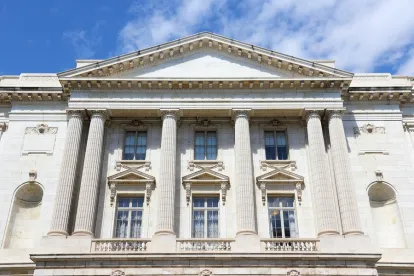U.S. Representatives Van Taylor (R-TX) and Al Lawson (D-FL) introduced a bipartisan bill yesterday that would require the Department of the Treasury (the “Treasury”) to establish and administer a facility to guarantee certain preferred equity investments in commercial real estate borrowers affected by the COVID-19 pandemic. The bill will be called the “Helping Open Properties Endeavor (HOPE) Act of 2020” or the “HOPE Act of 2020” (the “Act” or the “Revised Bill”). This memorandum summarizes the noteworthy changes between the initial version of the Act that was circulated earlier this month by Rep. Van Taylor (the “Draft Bill”) and was discussed in detail in our previous memorandum, COVID-19 Update: Draft Legislation Sparks HOPE of a New Commercial Real Estate Preferred Equity Facility by the Department of Treasury.
I. Changes in Borrower Eligibility Requirements
In order to limit the aid provided by the Act to only those properties that were not already distressed prior to the COVID-19 pandemic, among other criteria, the Draft Bill required that an eligible borrower not be in default under its commercial mortgage as of March 1, 2020. The Revised Bill modified this requirement to prohibit only borrowers that were in an uncured monetary default as of March 1, 2020. We believe this revision is a positive development in that it more narrowly tailors the requirement to address the actual underlying concern (i.e., not throwing good money after bad) without tripping up otherwise deserving borrowers as a result of non-monetary defaults unrelated to their financial soundness.
A second helpful change to borrower eligibility requirements modified the requirement that the property securing the commercial mortgage could not be owner-occupied. The initial provision was revised to allow for occupation of the property for management purposes or for de minimis occupancy. We view this modification to be a clarification to avoid the unintended consequence of disqualifying legitimate commercial landlords who simply maintain management offices or other de minimis space at their properties.
The Revised Bill also added an additional requirement that the borrower, or a parent of the borrower, must not have acquired the subject property after March 1, 2020 through a foreclosure process.
II. Preferred Equity Instrument Terms
The Revised Bill included several changes to the eligibility criteria for the terms of the preferred equity interest itself:
-
A revision to the criteria was made with respect to the rule allowing the financial institution to decide whether to make the preferred equity instrument secured or unsecured. The new requirement states that the instrument must not be secured by the property securing the commercial mortgage. We would note that this still leaves the door open to securing the instrument with other collateral, which is now also expressly permitted in the Revised Bill.
-
The Revised Bill expands the permitted use of funds from the preferred equity investments, now specifically allowing the funds to be used to pay the expenses of the parent company or a subsidiary of the parent company, for the administration or oversight of the borrower, as well as detailing certain additional permitted expenses.
-
Lastly, the Revised Bill increased the annual interest rate from 2.5% to 3%. Notably, though, the additional 50 basis points of interest are not for the benefit of the financial institution, but must be transferred to the Treasury to pay for administering the Act.
III. Payments to Financial Institutions
In addition to the change in interest rate described above, there are two other minor economic changes to note in the Revised Bill.
First, a financial institution’s failure to assess the default interest required under the Act or failure to notify the borrower of such assessment will only result in a forfeiture of one-half of the 1% percent annual servicing fee to which it is entitled under the Act if the servicing failure continues for three months.
Second, the Revised Bill tightens the requirement that a financial institution must repay its origination fee to the Treasury if the borrower defaults on 100% of the amount that the borrower draws down, now providing that the origination fee must be repaid if the borrower defaults on 90% or more of the amount drawn.
IV. Other Noteworthy Changes
The Revised Bill contains several other noteworthy changes, including:
-
The addition of a provision requiring a financial institution to sell its preferred equity instrument to the Treasury within 90 days after the related property is foreclosed on by its mortgage lender. The purchase price would be at par, plus interest and origination fees.1
-
A requirement that any borrower receiving financial assistance under the Act must immediately issue a public statement announcing such assistance. The Secretary of the Treasury (the “Secretary”) is also required to periodically make publicly available a list of borrowers that have received assistance under the Act.
-
The specification that national banking associations are now automatically eligible financial institutions without having to qualify as an eligible lender under section 7(a)(36) of the Small Business Act (15 U.S.C 636(a)(36)) or under section 1109 of the CARES Act (Public Law 116136).
-
The specification that borrowers will now be required to provide an approved guarantor (as approved by the financial institution), which must indemnify the financial institution and the Secretary if the borrower, any parent of the borrower or any affiliate of the borrower commits certain specified acts related to the property or the use of funds obtained under the Act.
-
A new provision allowing a financial institution to charge additional fees to a borrower from which it purchases a preferred equity interest.
V. Conclusion
Although the bipartisan introduction of the Act is a positive step in the direction of providing needed liquidity to commercial real estate borrowers, we are still a long distance away from enactment of the Act and the creation of a viable preferred equity facility. Additionally, it remains to be seen what changes might be made to the Revised Bill as it makes its way through Congress and what the final implementing regulations will look like. There are many important details that will need to be filled in before anyone can fully evaluate how successful the Act may be at mitigating the impending commercial real estate crisis. We will continue to update you with any legislative updates related to the Act.
1 The inclusion of origination fees in the purchase price after foreclosure seems to conflict with other provisions of the Act dealing with the origination fee. Elsewhere in the Act, the origination fees are specifically subtracted from the purchase price if the preferred equity interest is otherwise sold to the Treasury and, moreover, the Act provides for forfeiture of the origination fee upon default by the borrower as more specifically discussed above in this memo.





 />i
/>i
